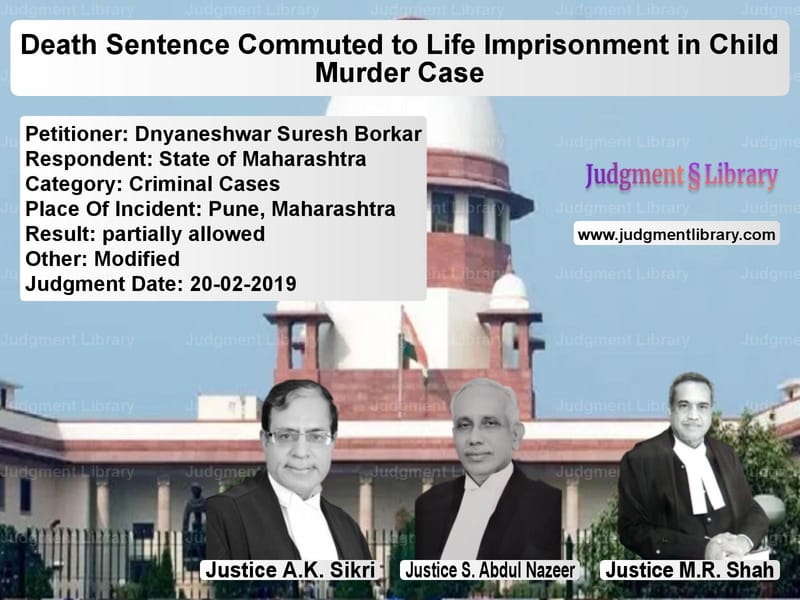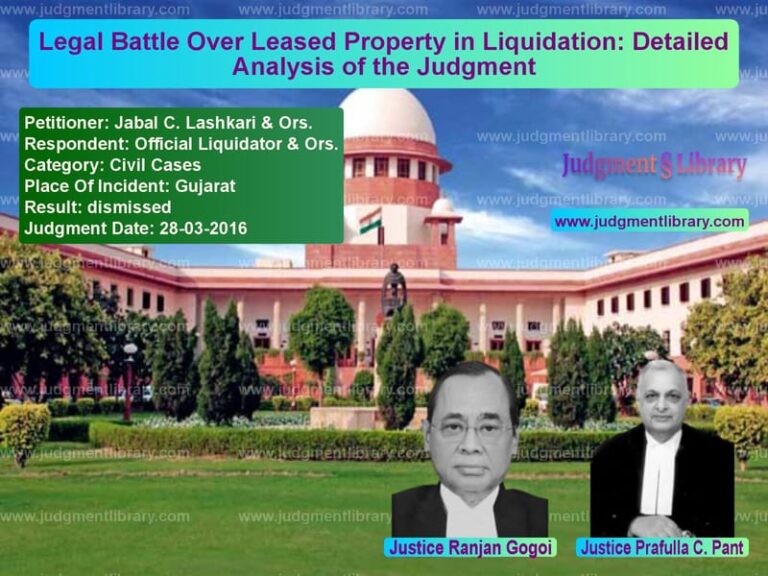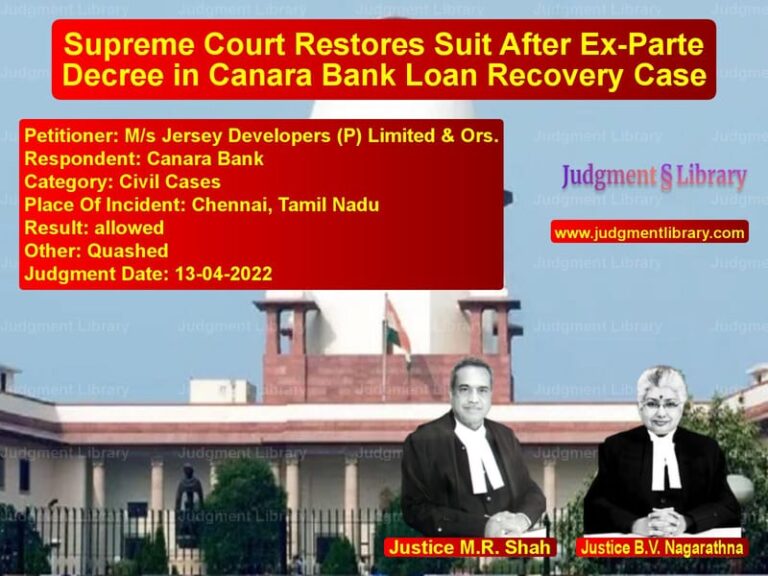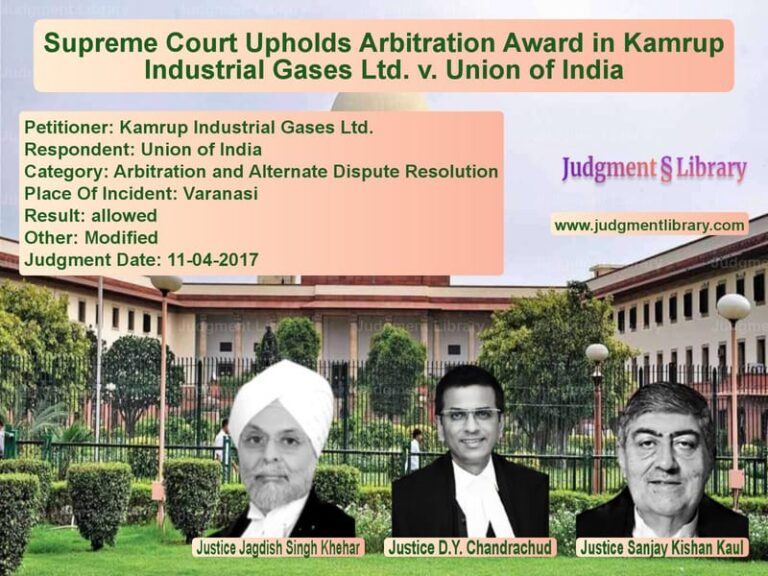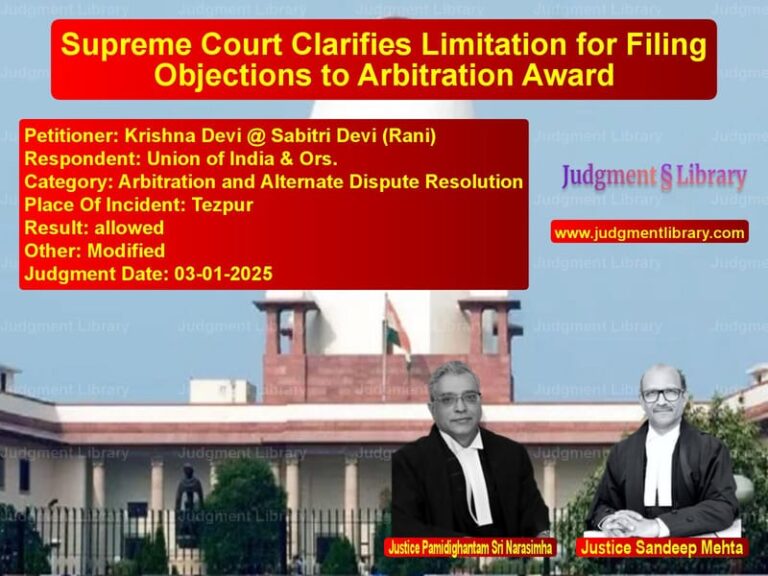Death Sentence Commuted to Life Imprisonment in Child Murder Case
The Supreme Court of India recently ruled on an appeal in the case of Dnyaneshwar Suresh Borkar vs. State of Maharashtra, concerning the conviction and sentencing of an individual accused of kidnapping and murdering a minor child for ransom. The case is significant as it highlights the application of the ‘rarest of rare’ doctrine in capital punishment cases. The Supreme Court, while upholding the conviction, commuted the death sentence to life imprisonment, taking into account various mitigating circumstances.
Background of the Case
The case dates back to the kidnapping and murder of a minor child, Rishikesh, committed by Dnyaneshwar Suresh Borkar. The accused was convicted under:
- Section 302 IPC (Murder)
- Section 364 IPC (Kidnapping for Ransom)
- Section 201 IPC (Causing Disappearance of Evidence)
The Sessions Court found the accused guilty and sentenced him to death, citing the brutal nature of the crime. The Bombay High Court upheld the conviction and confirmed the death penalty in 2006. The accused then appealed before the Supreme Court.
Arguments Before the Supreme Court
During the Supreme Court proceedings, the defense conceded the conviction but sought commutation of the death penalty to life imprisonment based on the following mitigating factors:
- The accused was 22 years old at the time of the crime.
- He had no prior criminal record and was not a hardened criminal.
- He had already spent 18 years in jail without remission.
- His conduct in prison was reported to be exemplary, and he had completed a Bachelor of Arts degree while incarcerated.
- He had undergone training in Gandhian philosophy and showed clear signs of reformation.
The defense further argued that the accused had shown remorse for his actions, and his behavior in prison indicated that he was capable of rehabilitation. The appellant’s counsel referred to Supreme Court precedents where death sentences were commuted due to reformative potential.
The State of Maharashtra, however, opposed the commutation, arguing:
- The crime was premeditated and brutal, involving the murder of a defenseless child.
- The act was committed for monetary gain, making it a crime of extreme depravity.
- Commuting the death penalty would dilute the deterrent effect of capital punishment in heinous crimes.
Supreme Court’s Analysis and Judgment
The Supreme Court examined the balance between aggravating and mitigating circumstances. It acknowledged the severity of the crime but emphasized the principles laid down in Bachan Singh vs. State of Punjab (1980), which mandate that the death penalty should be awarded only in the ‘rarest of rare’ cases when alternative punishments are unquestionably foreclosed.
The Court noted:
“Though the crime committed by the appellant is heinous, it does not fall into the category of cases where the alternative of life imprisonment is foreclosed.”
Key considerations for commutation included:
- The accused was a young adult at the time of the offense.
- There was no evidence of repeated violent behavior before or after the crime.
- His conduct in prison indicated reformation and rehabilitation.
- He had already spent 18 years in jail and had shown remorse.
The Supreme Court concluded:
“Though we acknowledge the gravity of the offense, we are unable to satisfy ourselves that this case falls within the ‘rarest of rare’ category warranting the death sentence.”
Final Judgment
The Supreme Court ruled:
- The conviction under Sections 302, 364, and 201 IPC was upheld.
- The death sentence was commuted to life imprisonment.
- The accused was given the right to apply for remission per legal provisions.
Impact and Significance of the Judgment
The ruling in Dnyaneshwar Suresh Borkar vs. State of Maharashtra highlights several critical aspects of India’s criminal justice system:
- Reformation Over Retribution: The judgment emphasizes that even convicted murderers can be rehabilitated if they demonstrate genuine remorse and reformation.
- Limited Use of Death Penalty: The Court reinforced the doctrine that capital punishment should be reserved for cases where no alternative punishment would serve justice.
- Age and Reformation Considerations: The decision underscores that young offenders, particularly those without prior criminal history, should be given opportunities for rehabilitation.
- Long Incarceration Periods as a Factor: The Court considered the 18 years already served in prison as an essential factor in determining the appropriate sentence.
Conclusion
The Supreme Court’s ruling in Dnyaneshwar Suresh Borkar vs. State of Maharashtra reinforces India’s commitment to judicial balance. By commuting the death sentence to life imprisonment, the Court upheld the principles of justice while recognizing the potential for reformation in certain convicts. This judgment serves as an important precedent in capital punishment cases and highlights the evolving approach of the judiciary in ensuring fairness in sentencing.
Petitioner Name: Dnyaneshwar Suresh Borkar.Respondent Name: State of Maharashtra.Judgment By: Justice A.K. Sikri, Justice S. Abdul Nazeer, Justice M.R. Shah.Place Of Incident: Pune, Maharashtra.Judgment Date: 20-02-2019.
Don’t miss out on the full details! Download the complete judgment in PDF format below and gain valuable insights instantly!
Download Judgment: Dnyaneshwar Suresh B vs State of Maharashtra Supreme Court of India Judgment Dated 20-02-2019.pdf
Direct Downlaod Judgment: Direct downlaod this Judgment
See all petitions in Murder Cases
See all petitions in Juvenile Justice
See all petitions in Judgment by A.K. Sikri
See all petitions in Judgment by S. Abdul Nazeer
See all petitions in Judgment by Mukeshkumar Rasikbhai Shah
See all petitions in partially allowed
See all petitions in Modified
See all petitions in supreme court of India judgments February 2019
See all petitions in 2019 judgments
See all posts in Criminal Cases Category
See all allowed petitions in Criminal Cases Category
See all Dismissed petitions in Criminal Cases Category
See all partially allowed petitions in Criminal Cases Category

